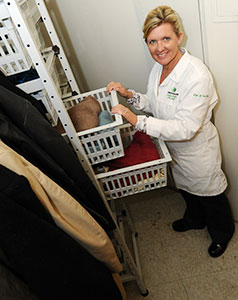Clothes cupboard opens to patients in need

Sometimes, patients are rushed to the hospital with their sole possessions—the clothes on their backs. In order to treat emergency and trauma patients quickly, their clothes are typically cut and removed.
“They are working frantically to save people, not clothes, so they cut their clothes off,” says Sandi Shelnutt, MSW, LCSW, social work supervisor. “But there are cases throughout the hospital in which people need clothes to wear home, either because their clothes were damaged or because they have no one to bring them clothes.”
For more than 20 years, social workers at Christiana and Wilmington hospitals have maintained clothes cupboards that enable patients who are poor, homeless or without friends or family to leave the hospital with a sense of dignity.
“We are here to help people who are often in horrible situations,” says Susan Greig, a social worker in the Trauma Department.
Almost every day, social workers or nurses dip into the cupboard to find clothes for patients. Recently, a teenage mother injured in a car wreck left the hospital in donated pants, shirt and shoes. A traveler injured in an accident on I-95 received a sweatsuit to wear on the trip back to Boston. In winter, homeless men receive gently worn sweaters and coats to protect them against the cold.
“When we review discharge plans, one of the questions we ask is ‘do you have clothes available?'” says Caroline Corzine, senior social worker in the Trauma Department. “It isn’t that unusual to have a patient who doesn’t have access to clothing.”
Paula Steele, a social worker assistant, has been maintaining the closet at Christiana Hospital since 2002. In the beginning, donations from the staff kept the cupboards stocked with trousers, shirts, sweaters, shoes and socks. But as the hospital expanded, donations did not keep pace with the need. Often, the clothes that did come in weren’t appropriate for a patient population that is largely male and requires loose-fitting clothes.
“We can’t use prom gowns and tiaras—or even dresses,” Steele says. “We are in great need of men’s clothes, size extra-large and up.”
Thanks to a donation from the Special Needs Fund at Christiana Care, the social workers can buy sweatpants, T-shirts and hoodies—soft and comfortable clothes that can be worn by both men and women. Steele travels to Rehoboth to buy sweats for both Christiana Hospital and Wilmington Hospital at a Vanity Fair Outlet that offers a generous discount.
Still, the cupboards are small and are in frequent need of restocking. Greig frequently picks up men’s clothing in larger sizes from Goodwill and the Salvation Army and launders them at home before taking them to the hospital.
“We’re here to help,” she says. “And if that means making sure people have clean, wearable clothes, that is what we do.”